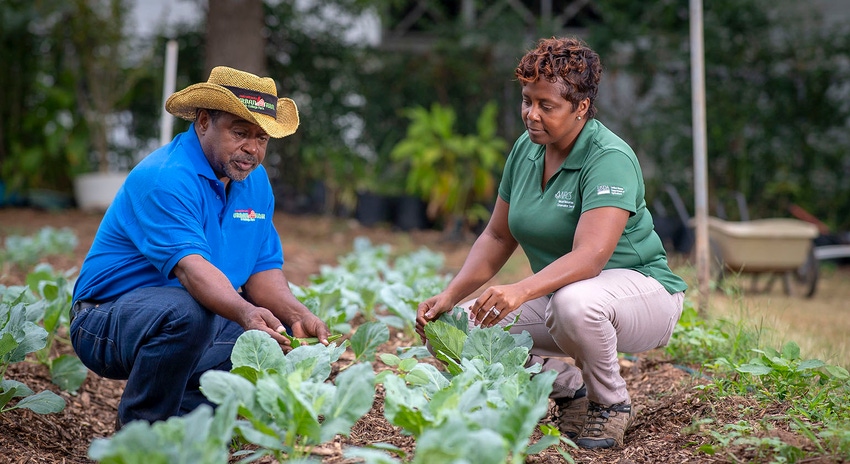Emergency Relief for Farmers of Color Act would provide direct payments to historically-underserved farmers of color.

New legislation introduced in the Senate is aimed at delivering direct relief to Black, Indigenous, and Hispanic farmers and other agricultural producers of color to help them respond to the consequences of the pandemic and resulting economic downturn, as well as address what lawmakers claim is longstanding inequity in agriculture from USDA and other government agencies. The Emergency Relief for Farmers of Color Act would provide $5 billion to America’s Black, Indigenous, Hispanic and farmers of color as part of the COVID relief package Congress is now working on.
The bill has the support of the White House as well as Secretary of Agriculture Designee Tom Vilsack who has been motivating the team behind the scenes to do more on racial equity related to COVID, according to a USDA spokesman.
The legislators state Black farmers in America alone have lost more than 12 million acres of farmland over the last century, mostly since the 1950. According to data from USDA, while at its peak in 1920 there were approximately 925,000 Black farmers in the United States, accounting for roughly one-sixth of U.S. farmers. By the year 2017 USDA’s Census of Agriculture reported there were only about 35,000 farms with Black producers — just 1.7% of the total number in the U.S.
Sens. Raphael Warnock, D-Ga., Cory Booker, D-N.J., Ben Ray Luján, D-N.M., and Senate Agriculture Committee Chairwoman Debbie Stabenow, D-Mich., introduced the bill Feb. 8 which provides $4 billion in direct relief payments to help farmers of color pay-off outstanding USDA farm loan debts and related taxes, and help them respond to the economic impacts of the pandemic. Additionally, the legislation provides another $1 billion fund to support activities at USDA that will root out systemic racism, provide technical and legal assistance to agricultural communities of color, and fund under-resourced programs that will shape the future for farmers and communities of color.
Specifically, this $1 billion fund will include:
Grants and loans to improve land access and address heirs’ property issues;
Support for one or more legal centers focused on agricultural legal issues of farmers of color;
Pilot projects that focus on land acquisition, financial planning, technical assistance, and credit;
A racial equity commission and related activities to address systemic racism across USDA;
Support for research, education, and extension at HBCUs and other institutions of higher education that historically serve communities of color;
Scholarships at 1890s land grant universities and for indigenous students attending land grant institutions;
Outreach, mediation, financial training, capacity building training, cooperative development training and support, and other technical assistance; and
Assistance to farmers, ranchers, or forest landowners of color that are former farm loan borrowers and suffered related adverse actions or past discrimination or bias.
"The pandemic has left Black farmers and other farmers of color in financial ruin; many Black farmers are in distress and facing farm foreclosures,” says John Boyd, founder and president of the National Black Farmers Association.
Katharine Ferguson, USDA chief of staff, notes the bill will bring much-needed economic assistance during the pandemic and begin to advance equity for farmers of color.
“The bill is the culmination of hard work and collaboration among members of the Senate and House and new leadership at USDA who share a common purpose to end inequity in our food and agricultural systems. It’s a bill crafted to address the immediate need for debt relief among those who have been marginalized and are hurting while also advancing long-term issues such as Heirs’ Property, tackling the root causes of discrimination via an Equity Commission, and investing in building back a new generation of farmers of color,” Ferguson says.
“As a small farmer, I know that farming is a tough job on any day and COVID-19 has exacerbated the challenges facing New Mexico’s farmers and ranchers. Yet, Hispanic, Native American and Black farmers in New Mexico did not receive their fair share of COVID-19 relief under the last administration,” says Luján. “Sadly, this treatment did not come as a surprise to New Mexico’s farmers of color, who have experienced discrimination by the USDA for generations. This legislation is an important step toward addressing this historic injustice, and it provides farmers and ranchers of color with the targeted relief needed to survive the pandemic and thrive in the years to come.”
“Rural communities in Georgia and across our nation have been slammed for years, and this once-in-a-century pandemic has put even more pressure on their hardship. Even worse, many Black farmers and other producers of color, like those I’ve met all over Georgia, have been left even further behind due to historical discrimination and a crippling lack of investment from the federal government for decades,” adds Warnock. “As Congress prepares to send significant assistance to help the American people get through this difficult time, we have to make sure that Black farmers and farmers of color, who for so long have not gotten the kind of support they need, get the debt relief and direct assistance necessary not only to move beyond this crisis, but to grow successfully into the future—building generational wealth within their families, and helping keep our rural communities and economy strong.”
The Emergency Relief for Farmers of Color Act is supported by Rural Coalition, National Black Farmers Association, Black Belt Justice Center and the Black Farmers’ Appeal: Cancel Pigford Debt Campaign.
House Agriculture Committee Chairman David Scott, D-Ga., and House Agriculture Appropriations Subcommittee Chairman Sanford Bishop, D-Ga., also is expected to release a similar proposal.
About the Author(s)
You May Also Like





